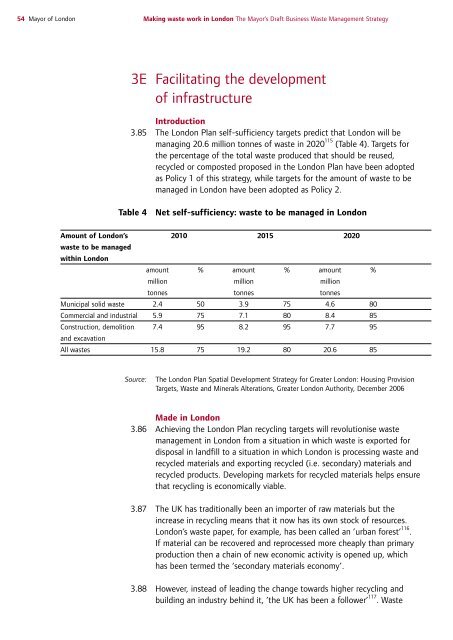Draft Business Waste Strategy PDF - london.gov.uk - Greater ...
Draft Business Waste Strategy PDF - london.gov.uk - Greater ...
Draft Business Waste Strategy PDF - london.gov.uk - Greater ...
Create successful ePaper yourself
Turn your PDF publications into a flip-book with our unique Google optimized e-Paper software.
54 Mayor of London<br />
Making waste work in London The Mayor’s <strong>Draft</strong> <strong>Business</strong> <strong>Waste</strong> Management <strong>Strategy</strong><br />
3E Facilitating the development<br />
of infrastructure<br />
Introduction<br />
3.85 The London Plan self-sufficiency targets predict that London will be<br />
managing 20.6 million tonnes of waste in 2020 115 (Table 4). Targets for<br />
the percentage of the total waste produced that should be reused,<br />
recycled or composted proposed in the London Plan have been adopted<br />
as Policy 1 of this strategy, while targets for the amount of waste to be<br />
managed in London have been adopted as Policy 2.<br />
Table 4 Net self-sufficiency: waste to be managed in London<br />
Amount of London’s<br />
waste to be managed<br />
within London<br />
2010 2015 2020<br />
amount % amount % amount %<br />
million million million<br />
tonnes tonnes tonnes<br />
Municipal solid waste 2.4 50 3.9 75 4.6 80<br />
Commercial and industrial 5.9 75 7.1 80 8.4 85<br />
Construction, demolition<br />
and excavation<br />
7.4 95 8.2 95 7.7 95<br />
All wastes 15.8 75 19.2 80 20.6 85<br />
Source: The London Plan Spatial Development <strong>Strategy</strong> for <strong>Greater</strong> London: Housing Provision<br />
Targets, <strong>Waste</strong> and Minerals Alterations, <strong>Greater</strong> London Authority, December 2006<br />
Made in London<br />
3.86 Achieving the London Plan recycling targets will revolutionise waste<br />
management in London from a situation in which waste is exported for<br />
disposal in landfill to a situation in which London is processing waste and<br />
recycled materials and exporting recycled (i.e. secondary) materials and<br />
recycled products. Developing markets for recycled materials helps ensure<br />
that recycling is economically viable.<br />
3.87 The UK has traditionally been an importer of raw materials but the<br />
increase in recycling means that it now has its own stock of resources.<br />
London’s waste paper, for example, has been called an ’urban forest’ 116 .<br />
If material can be recovered and reprocessed more cheaply than primary<br />
production then a chain of new economic activity is opened up, which<br />
has been termed the ‘secondary materials economy’.<br />
3.88 However, instead of leading the change towards higher recycling and<br />
building an industry behind it, ’the UK has been a follower’ 117 . <strong>Waste</strong>
















